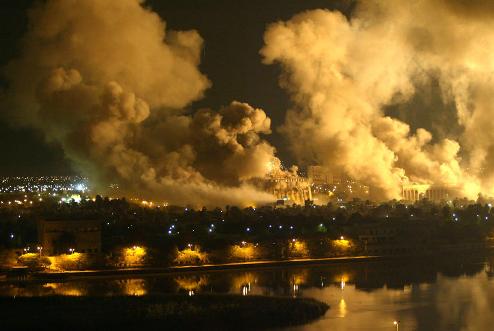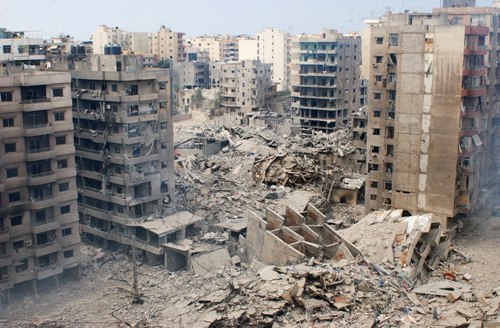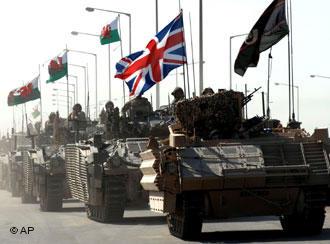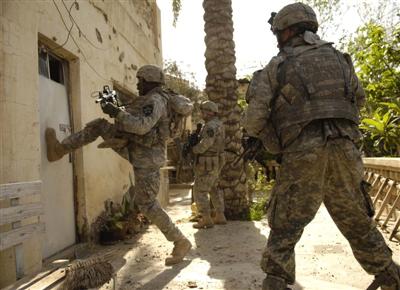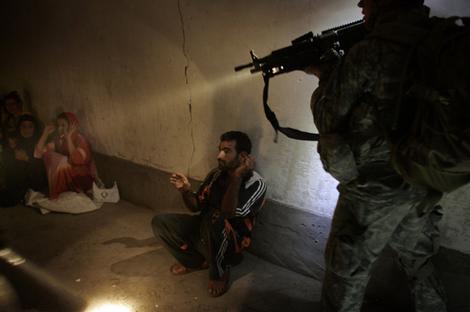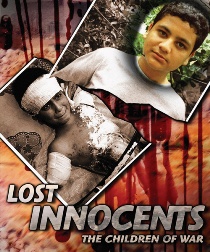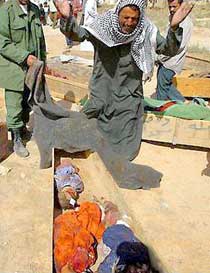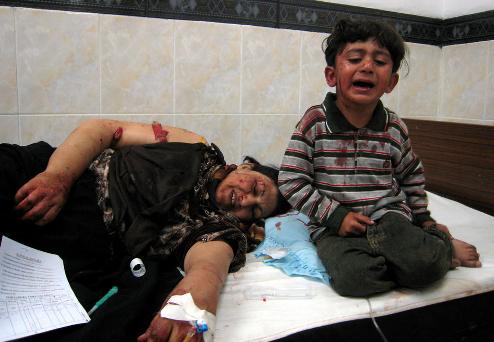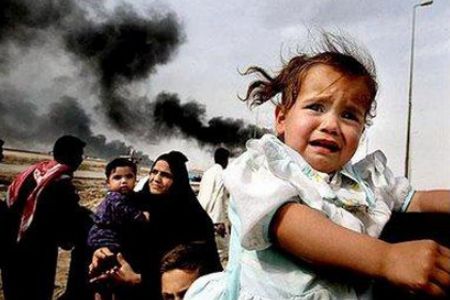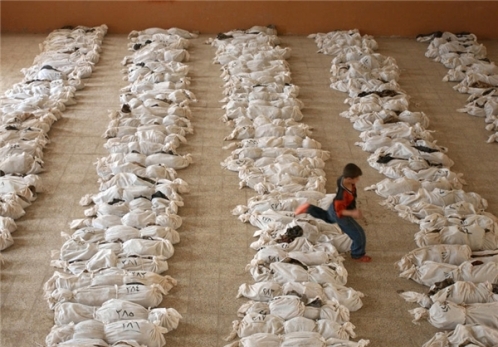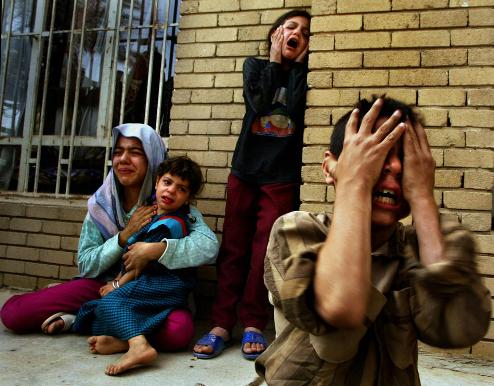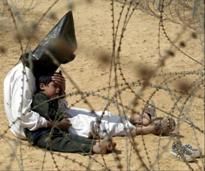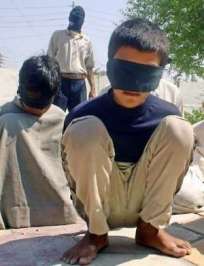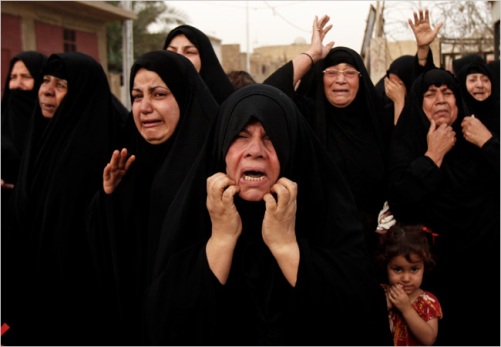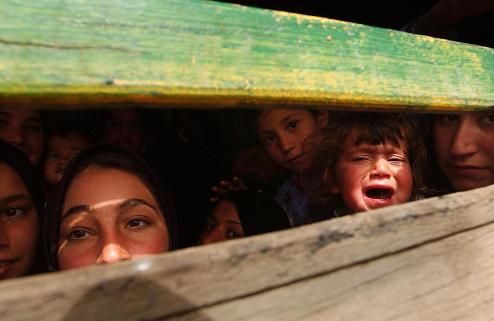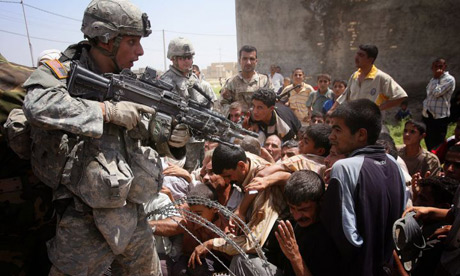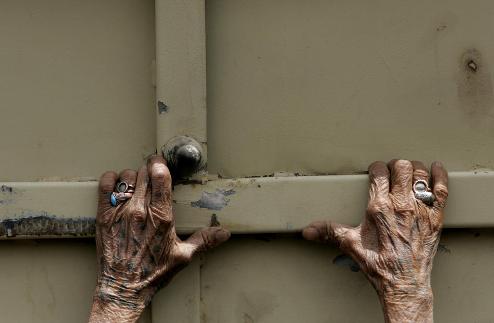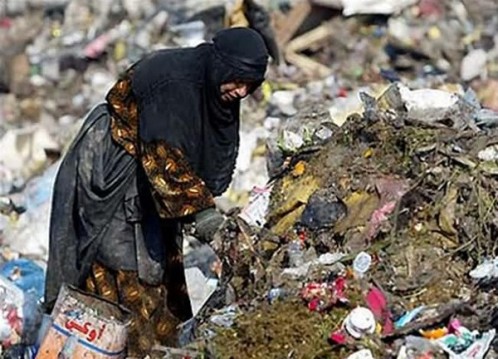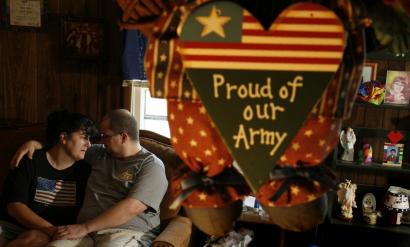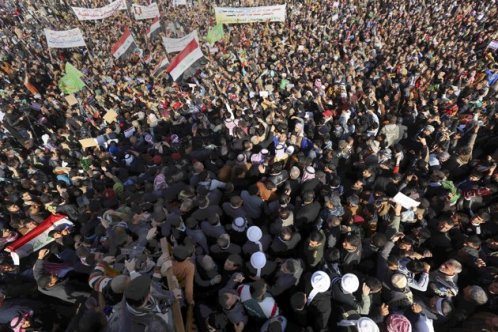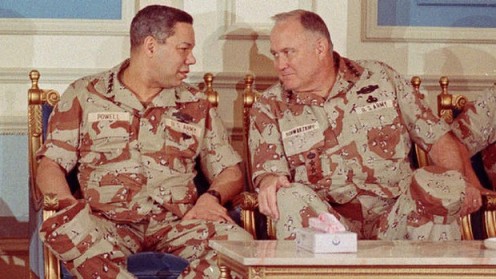|
Editor's Note: This is the first of a mini-series written by Axis of Logic Columnist, T.J. Coles as we approach the 10th anniversary of the US/British invasion of Iraq on March 20, 2003. On October 17, 2011 the New York Times cleverly began calling the war on Iraq, "The Forgotten War." We are among those who are working to make certain that the invasion and destruction of Iraq and the western state murders of more than a million Iraqi people will not be forgotten - not now, not ever. T.J. Coles writes about Iraq today. We begin this series with quotes and photos from the invasion taken, 2003. - Les Blough, Editor
“With weapons of evil, they conspire against the place of light.” - The Ginza March 2013 marks the tenth anniversary of the Anglo-American invasion of Iraq. Contrary to reports by the authorised Western media, the US has not withdrawn from the country. Permanent military bases, most notably camp al-Balad, have been erected;1 British and other mercenaries continue ground occupations in place of national armed personnel;2 and most of the country’s major oilfields have been 100% bought out by foreign (mostly Western) companies.3 Nearly a decade after Britain and America “brought democracy” to Iraq, UNICEF issued the following statement:
A Gallup poll released in 2012 suggests that for Iraqis, “daily emotional wellbeing has deteriorated along with the recent drop in life ratings” (i.e. quality of life). The poll found that “The percentage of Iraqis experiencing stress has doubled from 34% in 2008 to 70% in September 2011, and the percentage experiencing anger has increased from 38% to 60%”. Seventy per cent said they felt “stress”, sixty per cent “anger”, forty-six per cent “sadness”.5 “Life expectancy at birth in 2010” under Anglo-American occupation “was 58 years, down from 65 years in 1980” under the tyranny of Saddam Hussein.
It was understood by the invaders that the oil-rich country would not be allowed to develop its own resources its own way, but rather, that the Saddam Hussein regime would be replaced with a similar proxy.
That “momentary twinge of concern” continues to be prolonged agony for Iraqis. The choice of “democratic candidates” offered by the occupation forces included: Iyad Allawi of the Iraqi National Accord, who had close MI6 ties; the London-based, CIA-funded Iraqi National Congress led by the West’s puppet and Bilderberg Group attendee, Ahmed Chalabi; and Parliamentary records show links between the UK and Kurdistan’s Jalal Talabani dating back to at least 1991, and Al-Dawa’s leader, Ibrahim al-Jaafari, who became the Prime Minister in 2005. Clinton’s National Security Advisor, Sandy Berger, explained the essence of democracy promotion in December 1998: to “marshal all of the opposition groups and get them to work in some concert”.8 Three months before the invasion in 2003, hundreds of opposition groups met in the Metropole Hotel, London. The meeting included “mullahs, along with some 350 assorted Kurdish leaders, intellectuals, and members of the Iraqi diaspora,” writes Patrick Cockburn.
For years, there has been no discernable difference between Iraq’s Western-approved puppets and their previous collaborator, Saddam Hussein. Around 1,000 people are on death-row across Iraq, most of whom are journalists, activists, union leaders, etc. They are hanged after mock trials in kangaroo courts. The al-Maliki regime and its predecessors have a multitude of secret prisons. Practices by the Anglo-American-trained and armed Iraqi police in the open prisons are bad enough. Amnesty reports:
Blood & Oil The need to establish a Saddam Hussein-esque regime in post-invasion Iraq was predicated upon the lust for Iraqi oil. The reasons for controlling Iraq’s oil are manifold: to manipulate global prices; to make a growing China and India dependent upon Anglo-American controlled prices; to prevent socialist, Chavez-style development; to control supply-and-demand to “developing” nations; to rely on more stable supplies for domestic use; and, most important of all, to prepare the region for its role as an oil spigot in the New World Order—the Broader Middle East and North Africa Initiative. In 1997, the US Space Command’s “Vision for 2020” explained that the goal of world domination—Full Spectrum Dominance—is “to close the ever-widening gap between diminishing resources and increasing military commitments”.12 In his April 2002 term paper, US Army War College Lt. Col., William J. Bender, was more specific:
By 2010, the British Foreign Office spoke openly of a “bonanza of contracts for western companies”.15 As one can deduce from the above figures on declining life expectancy and general misery, Iraq’s one-in-three who have no access to safe water, 2 million internal and over 2 million external refugees, and 3 million or so war injured, do not get to share in their own resource-wealth. British taxpayers continue to finance the “training” of Iraqi “security forces” and subsidise arms shipments to the country. The UK is turning Iraq into a hi-tech, militarised police-State. From 2008 to 2010 alone, the UK exported the following weapons (just a small sample), worth tens of millions of pounds sterling annually:
Amnesty reported that “the new regulations” of Iraq’s Constitution “introduced on 25 June 2010 impede Iraqis from staging lawful protests”. It requires organisers to obtain the “written approval of both the Interior Minister and the provincial Governor” before they submit an application to their local police department, and “not less than 72 hours before a planned event”.18 Human Rights Watch reported:
Closing Remarks All of the above is of great interest to the authorised, mainstream British media: which is why it is suppressed. Part of living in the “information age” is the illusion that the public is well-informed, with up-to-date news about David Bowie’s latest single release, how competently medallist Tom Daley dived from a board into a swimming pool, how many people are stranded on icy roads, and a myriad of other data designed to deflect attention from Britain’s State-crimes and equalise all news to the same level of (un)importance. This is “info dominance.”20 By keeping the public fixated on the “eternal present” of gossip, sports, and national news, the public’s sense of history, personal responsibility, and with it humanity, is diminished. As David Cameron’s favourite singer Morrissey 21 put it, writing about Northern Ireland, though it could just as well be about Iraq: “We’re old news, all’s well
NOTES 1. Joseph Stiglitz and Lind Bilmes, 2008, The Three-Trillion Dollar War, London: Penguin. 2. Admin, “British and American Contractors Killed in Iraqi Green Zone”, American Contractors in Iraq, 24 January, 2013, 3. Stuart Bowen, “Quarterly Report and Semiannual Report to the United States Congress”, Special Inspector General for Iraq Reconstruction, 30 January, 2009, Washington, DC: Gov. Printing Office, 4. UNICEF, “Iraq and vulnerable Iraqis in the Egypt, Jordon, Lebanon, Egypt [sic] and Syrian Arab Republic”, 5. Gallup, ““Suffering” in Iraq Highest Since 2008”, 9 January, 2012, 6. Special Inspector General for Iraq Reconstruction, “Quarterly Report to the United States Congress”, October, 2011, Washington, DC: Gov. Printing Office, 7. Charles Tripp, Evidence to Parliament, “Report on the Future of Iraq”, November, 2002, Appendix 11, 8. T. Youngs and M. Oakes, “Iraq: “Desert Fox” and Policy Developments”, House of Commons Library, Research Paper 99/13, 10 February, 1999, 9. Patrick Cockburn, 2007, The Occupation, London: Verso. 10. Amnesty International, “New Order, Same Abuses”, September, 2010, London: Amnesty, 11. Human Rights Watch, “At a Crossroads”, February 2011, NY: HRW, 12. US Space Command, “Vision for 2020”, February, 1997, 13. William J. Bender, “Strategic Implication for U.S. Policy in Iraq: What Now?”, Strategy Research Project 20020604 207, 9 April, 2002, Pennsylvania: US Army War College, Carlisle Barracks, 14. Charles Tripp, Evidence to Parliament, November, 2002, Appendix 11, 15. Foreign and Commonwealth Office, “Iraq - a bright future or back to chaos?”, 2010, news release, 16. The website containing annual and quarterly weapons exports appears to have been closed down, but reports can still be found 17. Amnesty International, “Iraq: Civilians Under Fire”, April, 2010, London: Amnesty, 18. Amnesty International, “Days of Rage”, April 2011, London: Amnesty, 19. HRW, “At a Crossroads.” 20. For a tiny sample of the masses of crap that passes for news in the UK, see BBC News, “Tom Daley to make a second splash”, 5 February, 2013, or “Icy roads warning across country”, 22 January, 2013 http://www.bbc.co.uk/news/uk-england-leeds-21138060 or “David Bowie releases first single in a decade”, 8 January, 2013, 21. Guardian, “Morrissey supports Johnny Marr in David Cameron row”, 6 December, 2010. |

